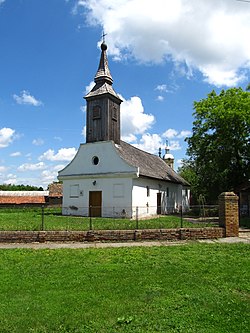Ečka
You can help expand this article with text translated from the corresponding article in Serbian. (March 2011) Click [show] for important translation instructions.
- View a machine-translated version of the Serbian article.
- Machine translation, like DeepL or Google Translate, is a useful starting point for translations, but translators must revise errors as necessary and confirm that the translation is accurate, rather than simply copy-pasting machine-translated text into the English Wikipedia.
- Consider adding a topic to this template: there are already 316 articles in the main category, and specifying
|topic=will aid in categorization. - Do not translate text that appears unreliable or low-quality. If possible, verify the text with references provided in the foreign-language article.
- You must provide copyright attribution in the edit summary accompanying your translation by providing an interlanguage link to the source of your translation. A model attribution edit summary is
Content in this edit is translated from the existing Serbian Wikipedia article at [[:sr:Ечка]]; see its history for attribution. - You may also add the template
{{Translated|sr|Ечка}}to the talk page. - For more guidance, see Wikipedia:Translation.
Village in Vojvodina, Serbia
Ečka Ечка | |
|---|---|
Village (Selo) | |
 Serbian Orthodox Church (1711) | |
45°19′04″N 20°26′20″E / 45.31778°N 20.43889°E / 45.31778; 20.43889 | |
| Country | Serbia |
| Province | Vojvodina |
| District | Central Banat |
| Elevation | 71 m (233 ft) |
| Population (2002) | |
| • Ečka | 4,513 |
| Time zone | UTC+1 (CET) |
| • Summer (DST) | UTC+2 (CEST) |
| Postal code | 23203 |
| Area code | +381(0)23 |
| Car plates | ZR |
Ečka (Serbian Cyrillic: Ечка, pronounced [êtʃka]; Hungarian: Écska) is a village located in the Zrenjanin municipality, in the Central Banat District of Serbia. It is situated in the autonomous province of Vojvodina.
Name and history
In Serbian, the village is known as Ečka (Ечка), in Romanian as Ecica or Ecica Română, in German as Deutsch-Etschka, and in Hungarian as Écska (until 1899: Német-Écska).
The village was merged with former settlement known as Mala Ečka (Мала Ечка) in Serbian, Alt Etschka in German, and Román-Écska or Olahécska in Hungarian.
Ethnic groups (2002 census)
The village has a Serb ethnic majority and its population numbering 4,513 people (2002 census).
- Serbs = 2,483 (55.02%)
- Romanians = 1,325 (29.36%)
- Hungarians = 196 (4.34%)
- Yugoslavs = 123 (2.73%)
- Romani = 72 (1.60%)
Historical population
- 1900: 4,892
- 1931: 5,207
- 1948: 3,934
- 1953: 4,188
- 1961: 4,323
- 1971: 4,621
- 1981: 5,293
- 1991: 5,172
Trivia
- Franz Liszt played piano at Kaštel castle as a nine-year-old boy.
See also
References
- Slobodan Ćurčić, Broj stanovnika Vojvodine, Novi Sad, 1996.
External links
- About Ečka (ADF/USAID)
Additional pictures
-
 The Romanian Orthodox Church
The Romanian Orthodox Church -
 The Catholic Church of St. John Baptist, built in 1864 as the third church
The Catholic Church of St. John Baptist, built in 1864 as the third church -
 Blazon of counts Lazar in Ečka
Blazon of counts Lazar in Ečka -
 Main street and the Catholic Church
Main street and the Catholic Church -
 The Kaštel castle, built in 1820, by count Lukács
The Kaštel castle, built in 1820, by count Lukács -
 Tower in Ečka
Tower in Ečka -
 Old wooden bridge over Begej 1995, built 1889, renovated 1894 and later 2005
Old wooden bridge over Begej 1995, built 1889, renovated 1894 and later 2005 -
 Old bridge over Begej 1995 with sheep and church in background
Old bridge over Begej 1995 with sheep and church in background
- v
- t
- e
Cities, towns and villages in the Central Banat District
(*) bold are municipalities or cities

Wikimedia Commons has media related to Ečka.



















